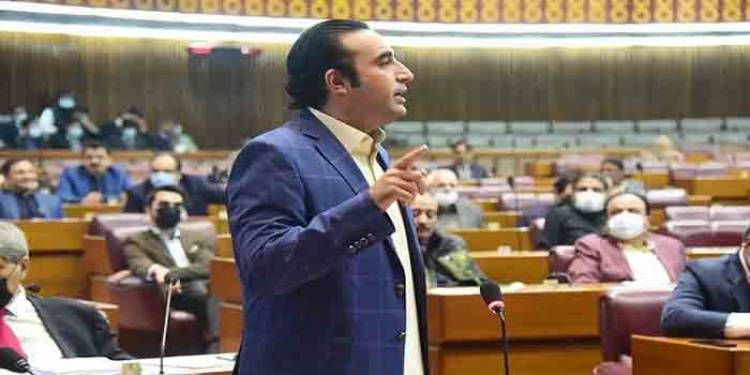
Pakistan Peoples Party (PPP) Chairman and Foreign Minister Bilawal Bhutto Zardari has said that the Supreme Court of Pakistan (SC) does not mean just the chief justice; in fact, it’s each and every member of the apex court that forms the SC.
While addressing the National Assembly (NA) session, Bilawal said that the same judiciary gave the verdict that the government does not mean the prime minister; the government means the entire cabinet of Pakistan, and the prime minister cannot take any decision on his own without approval from the cabinet. He added, similarly, that the Supreme Court of Pakistan (SC) does not mean just the chief justice; in fact, it’s each and every member of the apex court that forms the SC.
During his address, Bilawal Bhutto urged the speaker to form a joint parliamentary committee comprising Senate members, National Assembly members, government representatives, and opposition members. "So that we may pass legislation and take decisions," he added.
On Monday, two judges of the Supreme Court on Monday released a 27-page order, stating that the suo motu case on the elections in Punjab and Khyber Pakhtunkhwa stands dismissed.
In their decision, Justice Syed Mansoor Ali Shah and Justice Jamal Khan Mandokhail stated that the case was dismissed by a majority of four judges out of the total seven.
“We find it essential to underline that in order to strengthen our institution and to ensure public trust and public confidence in our Court, it is high time that we revisit the power of one man show enjoyed by the office of the Chief Justice of Pakistan” the order read.
It went on to add that “his court cannot be dependent on the solitary decision of one man, the Chief Justice, but must be regulated through a rule-based system approved by all judges of the court under Article 191 of the Constitution.”
On March 1, the Supreme Court of Pakistan ordered that elections in Punjab and Khyber Pakhtunkhwa must take place within the next 90 days.
Justice Shah and Justice Jamal Mandokhail dissented from the majority’s decision, leaving the judgment split 3-2. The decision was endorsed by Chief Justice of Pakistan Umar Ata Bandial, Justice Munib Akhtar, and Justice Muhammad Ali Mazhar.
A day prior to the verdict, CJP Bandial vowed to protect the Constitution, not a particular political party. He remarked, “We cannot abandon the Constitution, and we cannot override the Constitution.”
When the Punjab and KP provinces were dissolved earlier this year, the Chief Justice initially convened a nine-member bench to hear the suo motu notice regarding the delay in the elections.
Justices Ijaz-ul-Ahsan and Sayyed Mazahar Ali Akbar Naqvi had withdrawn from the hearing at the outset due to concerns about their eligibility to be a part of the bench.
While expressing their views on the maintainability of petitions on the subject, two further judges, Justice Afridi and Justice Minallah, had also recused themselves from the proceedings.
While addressing the National Assembly (NA) session, Bilawal said that the same judiciary gave the verdict that the government does not mean the prime minister; the government means the entire cabinet of Pakistan, and the prime minister cannot take any decision on his own without approval from the cabinet. He added, similarly, that the Supreme Court of Pakistan (SC) does not mean just the chief justice; in fact, it’s each and every member of the apex court that forms the SC.
During his address, Bilawal Bhutto urged the speaker to form a joint parliamentary committee comprising Senate members, National Assembly members, government representatives, and opposition members. "So that we may pass legislation and take decisions," he added.
On Monday, two judges of the Supreme Court on Monday released a 27-page order, stating that the suo motu case on the elections in Punjab and Khyber Pakhtunkhwa stands dismissed.
In their decision, Justice Syed Mansoor Ali Shah and Justice Jamal Khan Mandokhail stated that the case was dismissed by a majority of four judges out of the total seven.
“We find it essential to underline that in order to strengthen our institution and to ensure public trust and public confidence in our Court, it is high time that we revisit the power of one man show enjoyed by the office of the Chief Justice of Pakistan” the order read.
It went on to add that “his court cannot be dependent on the solitary decision of one man, the Chief Justice, but must be regulated through a rule-based system approved by all judges of the court under Article 191 of the Constitution.”
On March 1, the Supreme Court of Pakistan ordered that elections in Punjab and Khyber Pakhtunkhwa must take place within the next 90 days.
Justice Shah and Justice Jamal Mandokhail dissented from the majority’s decision, leaving the judgment split 3-2. The decision was endorsed by Chief Justice of Pakistan Umar Ata Bandial, Justice Munib Akhtar, and Justice Muhammad Ali Mazhar.
A day prior to the verdict, CJP Bandial vowed to protect the Constitution, not a particular political party. He remarked, “We cannot abandon the Constitution, and we cannot override the Constitution.”
When the Punjab and KP provinces were dissolved earlier this year, the Chief Justice initially convened a nine-member bench to hear the suo motu notice regarding the delay in the elections.
Justices Ijaz-ul-Ahsan and Sayyed Mazahar Ali Akbar Naqvi had withdrawn from the hearing at the outset due to concerns about their eligibility to be a part of the bench.
While expressing their views on the maintainability of petitions on the subject, two further judges, Justice Afridi and Justice Minallah, had also recused themselves from the proceedings.

